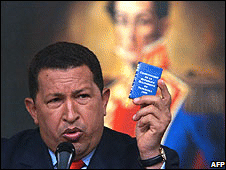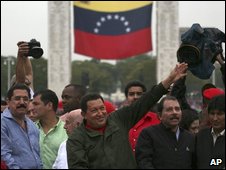- Reaction score
- 0
- Points
- 360
Looks like like "Hugo the puto" still hasn't taken the advice of the King of Spain to "shut up". :
Venezuelan President Hugo Chavez apparently doesn't appreciate Barack Obama's classifying him as a supporter of the Colombian terror group, FARC, likening the president-elect's odor to that of Chavez's nemesis, President Bush.
In an interview airing on Venezuelan television and reported by The Washington Post Monday, Chavez said Obama has "the same stench" as Bush. The comment harkens back to September 2006, when Chavez addressed the United Nations General Assembly after Bush and said he could still smell the "sulfur" the U.S. president left behind at the podium.
In an interview that aired on Univision last week, Obama said his administration would try to improve relations with Chavez, but Venezuela has to stop aiding FARC, the Revolutionary Armed Forces of Colombia, which is recognized as a terror group by the United States and loathed by Colombians who have been victims of assassinations and kidnappings for the past 45 years. Internal FARC documents captured by Colombian soldiers last year purportedly demonstrated the link between Chavez and the terror organization.
The Post reported that Obama told Univision: "We need to be firm when we see this news, that Venezuela is exporting terrorist activities or supporting malicious entities like the FARC."
Chavez, who is trying to consolidate power by getting voters to agree to abolish term limits, a ploy rejected in a previous effort, was quoted saying that if Obama thinks that Chavez is an obstacle to progress then he must be following orders from certain corners of "the empire."
"If he doesn't obey the orders of the empire, they'll kill him," Chavez said, without naming who "they" are.
"http://www.foxnews.com/politics/2009/01/19/chavez-likens-obamas-stench-bushs/"



